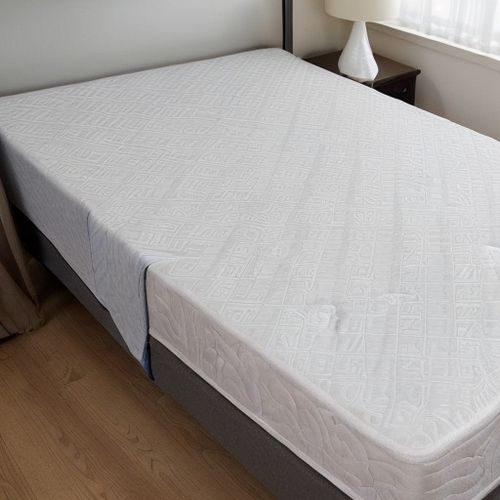Choosing the right mattress is one of those decisions that can significantly impact your daily life, yet many people don’t give it the attention it deserves. A good mattress doesn’t just ensure a comfortable night’s sleep—it plays a crucial role in maintaining your overall health. From back pain to sleep quality, the type of mattress you sleep on can either alleviate or exacerbate these issues. The challenge, however, lies in navigating the overwhelming number of options available, each promising the perfect night’s rest. To make an informed choice, you need to consider factors like firmness, material, and how they relate to your specific health needs.
Firmness is often the first thing people think about when selecting a mattress, and for good reason. A mattress that’s too soft may cause your body to sink, leading to poor spinal alignment, while one that’s too firm can create pressure points, resulting in discomfort. The ideal firmness level depends largely on your sleeping position. Side sleepers, for instance, generally benefit from a medium-soft to medium-firm mattress that cushions the shoulders and hips. Back sleepers, on the other hand, usually need a medium-firm surface to maintain proper lumbar support. Stomach sleepers often require a firmer mattress to prevent their hips from sinking too deeply, which can strain the lower back.
But firmness isn’t just about comfort—it’s also about health. Chronic pain sufferers, particularly those with back issues, may find relief with a mattress that offers targeted support. A study published in the Journal of Chiropractic Medicine found that medium-firm mattresses tend to provide the best balance of comfort and spinal alignment for individuals with lower back pain. However, personal preference still plays a significant role. What feels supportive to one person might feel uncomfortably rigid to another. Testing a mattress in-store or taking advantage of sleep trials can help you determine the right level of firmness for your body.
Beyond firmness, the material of the mattress is equally important. Traditional innerspring mattresses are known for their bounce and airflow, making them a good choice for those who sleep hot. However, they may not offer the same pressure relief as memory foam or latex. Memory foam, which contours closely to the body, is excellent for relieving pressure points and reducing motion transfer—ideal for couples. Yet, some memory foam mattresses retain heat, which can be problematic for hot sleepers. Newer models with gel-infused foam or open-cell structures aim to address this issue.
Latex mattresses, whether natural or synthetic, provide a unique combination of support and responsiveness. Natural latex, derived from rubber trees, is durable, hypoallergenic, and eco-friendly, though it tends to be more expensive. Synthetic latex is more affordable but may lack some of the benefits of its natural counterpart. Hybrid mattresses, which combine innerspring coils with foam or latex layers, offer a middle ground, blending support with cushioning. The choice of material ultimately depends on your priorities—whether it’s cooling properties, eco-friendliness, or motion isolation.
The connection between mattress selection and health cannot be overstated. Poor sleep quality has been linked to a host of issues, including weakened immunity, weight gain, and even cardiovascular problems. A mattress that doesn’t support your body properly can lead to restless nights, leaving you fatigued and less productive during the day. Allergies are another consideration; dust mites thrive in older mattresses, potentially triggering respiratory issues. Opting for hypoallergenic materials or using a mattress protector can mitigate these risks.
For those with specific health conditions, such as arthritis or fibromyalgia, the right mattress can make a world of difference. Softer surfaces may cushion painful joints, while firmer options might aggravate them. Similarly, individuals with acid reflux may benefit from an adjustable bed frame that elevates the upper body, reducing nighttime discomfort. Consulting a healthcare provider or a sleep specialist can provide personalized recommendations based on your medical history.
Ultimately, selecting a mattress is a deeply personal decision that requires balancing comfort, support, and health considerations. While research and expert opinions can guide you, listening to your body is paramount. A mattress that feels right for you—regardless of trends or marketing claims—is the one that will contribute to better sleep and, by extension, better health. Investing time in choosing the right mattress now can pay off in countless restful nights and energized mornings for years to come.

By Thomas Roberts/Apr 25, 2025

By Daniel Scott/Apr 25, 2025

By Thomas Roberts/Apr 25, 2025

By Daniel Scott/Apr 25, 2025

By Lily Simpson/Apr 25, 2025

By Megan Clark/Apr 25, 2025

By Christopher Harris/Apr 25, 2025

By Amanda Phillips/Apr 25, 2025

By John Smith/Apr 25, 2025

By Michael Brown/Apr 25, 2025

By Daniel Scott/Apr 25, 2025

By Olivia Reed/Apr 25, 2025

By Elizabeth Taylor/Apr 25, 2025

By James Moore/Apr 25, 2025

By John Smith/Apr 25, 2025

By William Miller/Apr 25, 2025

By Daniel Scott/Apr 25, 2025

By Emma Thompson/Apr 25, 2025

By James Moore/Apr 25, 2025

By Ryan Martin/Apr 25, 2025